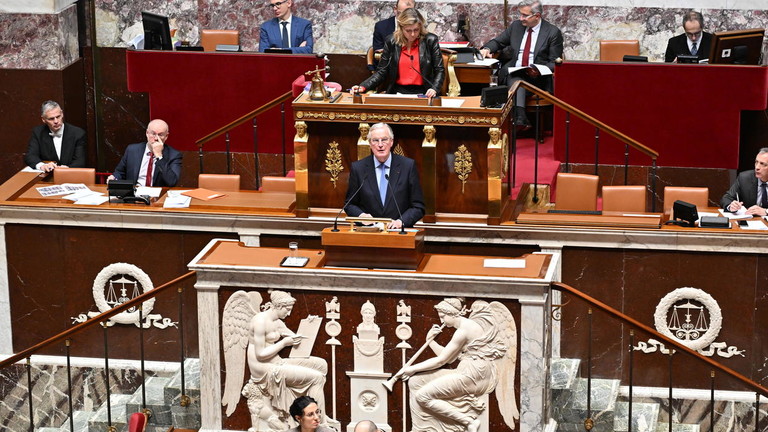Headlines
French Parliament Rejects No-Confidence Motion Against Macron’s PM

The French Parliament votes on a no-confidence motion against Prime Minister Élisabeth Borne, affirming her position despite mounting political tensions and opposition challenges.
French Prime Minister Michel Barnier has been ousted after losing a no-confidence vote in parliament, with lawmakers from both the left and right joining forces to remove him.
A no-confidence motion needs 288 votes to pass in the National Assembly. On Wednesday evening, the motion garnered 331 votes, as both the left-wing New Popular Front (NPF) and right-wing National Rally (RN) joined forces against President Emmanuel Macron’s imposed minority cabinet.
“I don’t see it as a victory,” Marine Le Pen of RN stated to TF1 following the vote. “We made our choice in order to safeguard the French people.”
“It was not a decision made lightly,” Le Pen remarked. “There was no alternative.”
Jean-Luc Melenchon, the leader of NPF’s largest party, described the outcome as “inevitable” and demanded Macron’s resignation.
“He stated on X, ‘Even with a Barnier every three months, Macron will not last three years.’ Despite this prediction, the French president has discounted any possibility of resigning.”
In September, Macron appointed Barnier, provoking the anger of NPF. Earlier in the summer’s snap elections, a left-wing coalition had secured the most seats in parliament through an agreement with the president aimed at sidelining RN. However, instead of honoring this pact, Macron opted for a minority cabinet that depended on discreet support from RN—a move seen as dismissive towards NPF.
The situation intensified regarding the social security budget proposal, where Barnier attempted to reduce spending by €40 billion ($41.87 billion) and increase taxes by €20 billion to address a significant deficit. RN warned of initiating a no-confidence vote unless the cabinet agreed to several concessions on its “red lines.”
Le Pen criticized the prime minister, describing them as “extremely closed-minded and sectarian” during the budget discussions. She set a deadline for Barnier to address RN’s demands, but Budget Minister Laurent Saint-Martin dismissed this ultimatum.
Since the establishment of the Fifth Republic in 1958, nearly 150 no-confidence motions have been introduced. Before Wednesday, only one government had ever been removed as a result—Georges Pompidou’s administration in October 1962.
Barnier is expected to remain as interim Prime Minister until President Macron appoints a successor. After the parliamentary election in July, it took nearly two months for the French president to make such an appointment. Holding another vote isn’t feasible since the French constitution prohibits it for at least a year following an election.
